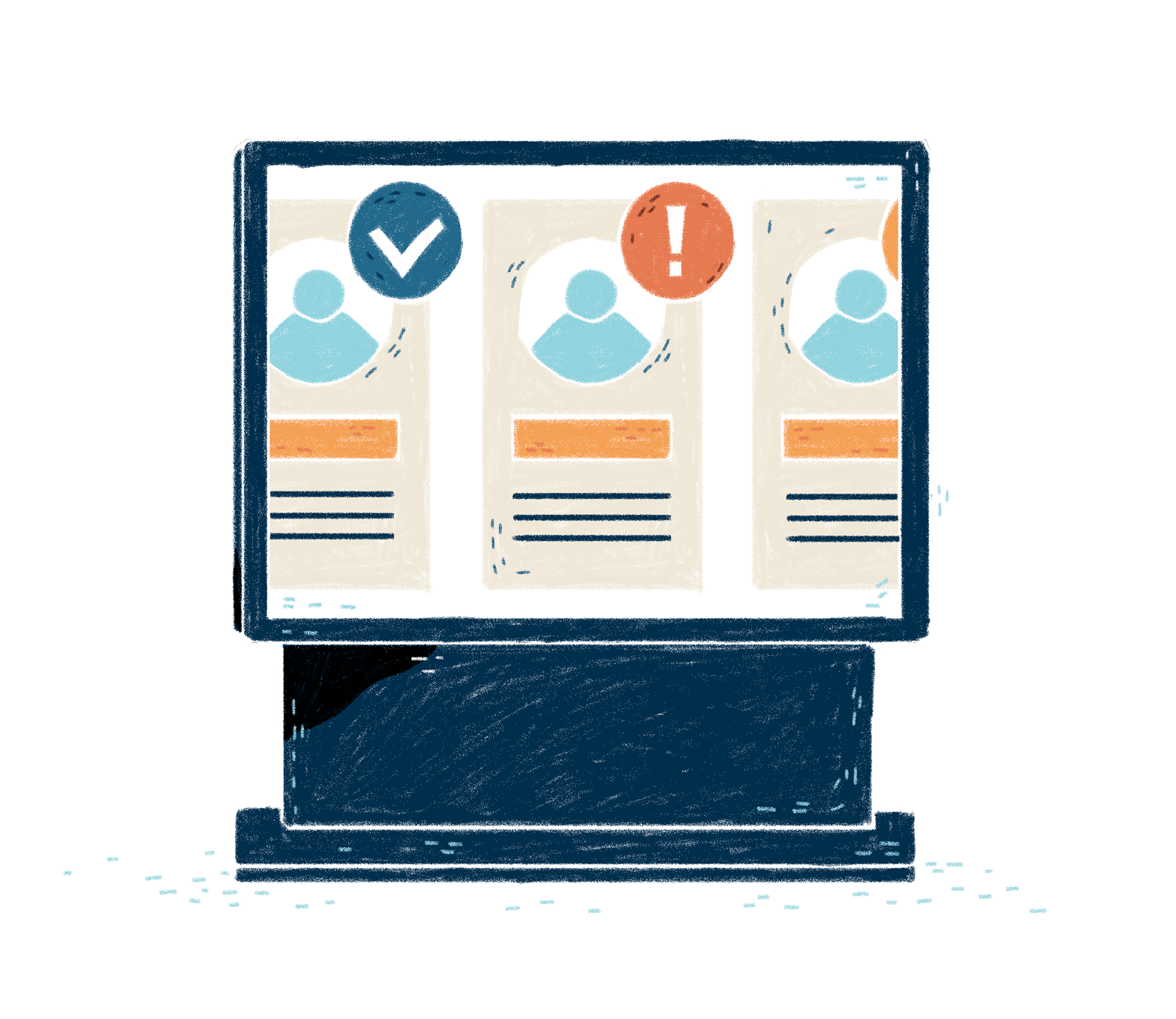Canvas is purpose built to accommodate every stage of scale for a care organization. This is absolutely true for behavioral health as well - whether you’re building a cash-pay digital mental health clinic, an evidence-based treatment program targeting Medicare/Medicaid, or any meaningful behavioral health care model in between, Canvas can meet your needs, even as your needs evolve. Let’s learn about how you can launch your behavioral health program in as little as 8 weeks.
You will learn how Canvas can do the following and more for your behavioral health organization:
- Patient intake and engagement before your visit
- Customize how your organization performs measurement-based care during the visit
- Automate your care coordination and delegation of operational tasks after the visit
- Build the above and more into your Canvas experience through code
Before the visit
As your relationship begins with your patient, you can easily schedule and manage appointments with your new patient, in person and through telehealth visits. You can send automated reminders via text or email to decrease no-show rates. In between scheduling and the appointment, you can collect patient intake and registration information.
If you've connected your patient app to Canvas through our bi-directional FHIR API, you can start collecting structured data in Canvas as soon as your patients engage with your app.
Perform Measurement-Based Care - before the visit
If your care is in person, Canvas’s Narrative Charting allows your Care Team to perform many critical actions seamlessly within an uninterrupted workflow, while also capturing necessary data in structure.
Within the Charting experience, your Canvas instance will come pre-loaded with common behavioral health assessments listed below in the form of our Questionnaire command.
- PHQ-2
- PHQ-9
- GAD-2
- GAD-7
- ADHD self-report scale
Canvas’s Protocols enable measurement-based care by surfacing the most relevant information to your Care Team at the point of care. For instance, let's look at the below gif:
- An intake performed on patient Steven Davis finds an elevated PHQ-9
- Canvas automatically responds to the score with the creation of an Alert Banner (red highlight, left of screen upon completion of intake)
Protocols can be created by your engineering team through Canvas's Workflow SDK. As you'll read more about below, they enable deep extension of your organization's Canvas instance so that these types of product interactions (and more!) are custom to your care model.

If your app wrote in Questionnaire data prior to the visit, your patient's chart would be pre-loaded with the data submitted by your patient.
You can also always create a new custom Questionnaire (directions here!) to customize your collection of structured clinical data. Below, you’ll see a custom-built intake Questionnaire that screens for the patient’s sleep, mood, eating, and stress.

During the visit
As your Care Team meets with your patient, Canvas drives top-of-license care by enabling efficiency and custom workflow at every step.
Automations are a key feature in Canvas that allow you to sequence many Commands together. Think of these as Macros in Excel / Google Sheets, but supercharged for clinical context.
Below, you'll find an example of a “Major Depressive Disorder” automation you could create:
- Questionnaire - PHQ-9
- Perform - CPT Code 90801: Psychiatric diagnostic interview examination
- Diagnose - Major Depressive Disorder
- Prescribe - Fill in suitable MDD medication at point of care
- Instruct - Depression Education
Once building the Automation, every time you diagnose MDD, you can enter the Automation to surface the Commands in sequence, adjusting where relevant to fit the needs of your patient.

In addition, for future appointments, Canvas will display the patient’s conditions and prior assessments alongside your core Charting workflow so that you can document with context.
Structured Assessments function similarly to Questionnaires (you can create a custom one in the same way too!), but they will map results and answers to ICD-10 and CPT codes, so that relevant claims are billed and relevant conditions/diagnoses are updated in the patient chart summary.
Below, you’ll see a custom-built Structured Assessment for behavioral health therapeutic interventions in action. Upon performing a Structured Assessment for Therapy, note that CPT code 90853 is automatically logged, removing duplicate workflow.

As the visit comes to a close, you can easily do the following within the core Charting workflow as well:
- Schedule a follow-up visit
- Electronically prescribe and send medications, including controlled substances when necessary
- Have information relevant to your documentation reflected in Revenue Cycle Management tasks and process
After the visit
Care Coordination
From individual therapist practices to multi-state behavioral health organizations, strong care coordination is critical for not only effective workflow but patient outcomes.
With Canvas, you have the ability to designate a Care Team for your patient (along with other forms of teams).
Tasks, accessible within the context of the core Charting workflow and the Task List, allow your Care Team to coordinate and delegate activities to the most appropriate team member, or even designated teams. Canvas already comes off the shelf with built-in automated task delegation.
For example, the clinician can use the Referrals command in their charting workflow and auto-generate subsequent relevant referral Tasks for the Care Team to execute.
In the below example, you'll find your clinician performing the following:
- Refer - Behavioral Neurology & Neuropsychiatry
- Task - Follow-up on patient medication (pre-filled through an Automation)
Upon creation of the task, you'll see that the Task automatically appears in the Task queue for your Care Team members to perform.

Care Model Development Platform
Not only does Canvas provide your Care Teams the above and more out-of-the-box, it’s also an extensible, headless EMR platform for your developers to customize your overall behavioral health experience.
An API-first EMR
Our bi-directional FHIR API offer flexibility and connectivity. Here are some examples of how our customers have used them:
- Connect in-house patient-facing apps for behavioral health to the Canvas EMR to ensure structured data capture while performing patient intake and providing novel patient experiences
- Ingest billing/RCM data for mining business analytics
An extensible EMR experience
Separately, our Workflow SDK allows you to write simple Python code to customize Canvas or automate workflows. Here are just a few examples of what you can do with the SDK:
- If the patient is noted to be diabetic, generate a Recommendation to change the medication from olanzapine to ziprasidone (Prescribe Command example here)
- If the patient has previously no-showed for an appointment, generate a Task for the Care Team to reach out to the patient 1 day prior to the appointment (Appointment Task Creation example here)
- If the patient is high risk or has behavioral health issues, display a warning banner in various parts of the chart (Banner Alert example here)
- If the patient has been on depression therapy for 2 months, generate an Interview Recommendation to repeat a PHQ-9 Questionnaire
Read more in depth about what you and your developer team can accomplish with Canvas's Protocols in our Documentation.
Future Releases
As tech-enabled behavioral healthcare continues to evolve, so will Canvas to support its growing needs. The following are a few of the releases in our near-future roadmap that will enhance your behavioral health organization. (Visit our Product Collaboration Portal to find our public roadmap and contribute your ideas!)
Permissioning - To support complex organizations with a variety of end-users who should be placed at different levels of access
Programs - To enable organizations building care management programs to enroll, support, and manage patients in said programs
Group Notes - To support organizations building care models specific to groups of patients

